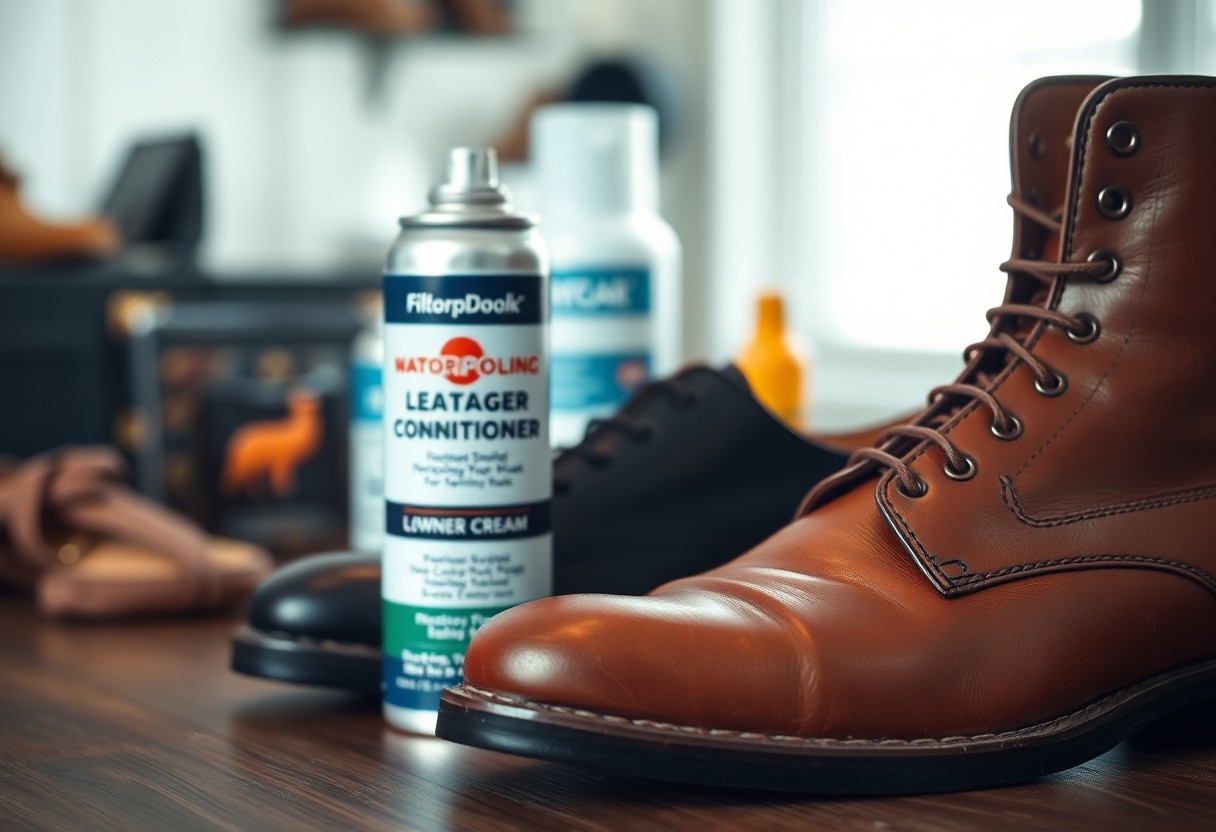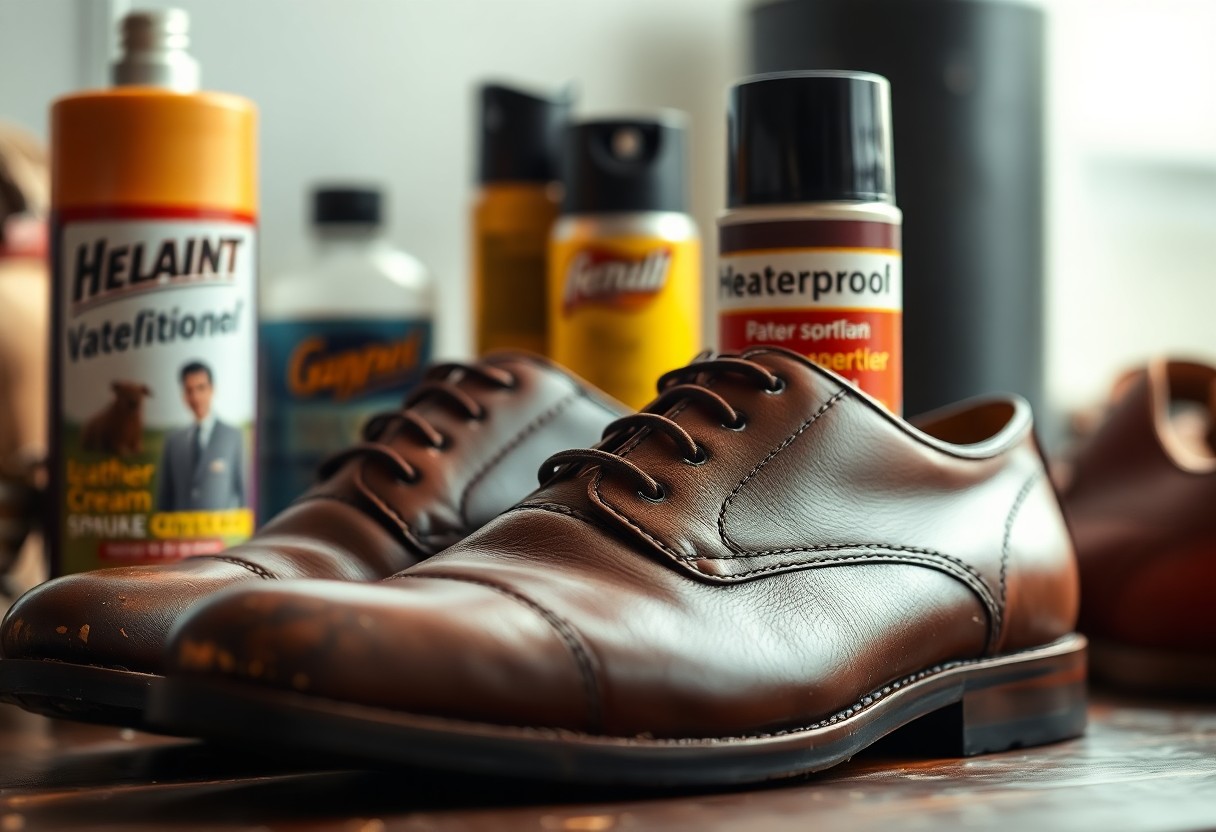Leather care mistakes can result in permanent damage to your valuable shoes, with one common mistake being the application of waterproofing spray on smooth leather. Although these sprays seem like a quick fix for safeguarding your footwear, they can hinder essential nutrients from penetrating the leather, ultimately leading to drying and cracking over time. Smooth leather shoes are crafted with inherent water-resistant properties within their grain layer, and they require proper nourishment through shoe creams and waxes to maintain their longevity. Instead of relying on sprays, choose high-quality leather conditioners and wax polishes that protect while nourishing the leather, ensuring its durability and maintaining its natural characteristics.
Mastering the Fundamentals of Leather Protection for Longevity
Understanding the protective qualities of your leather goods is essential for their long-term durability. Full grain leather inherently possesses natural water-resistant properties thanks to its tightly woven fiber structure. However, these properties demand regular maintenance to remain effective. The longevity of your leather items is directly influenced by the care they receive. Using waterproofing sprays can compromise the leather’s ability to breathe, leading to severe damage if not addressed appropriately. To keep your leather in optimal condition, it’s vital to adopt a comprehensive care routine that emphasizes regular conditioning and protection.
Unlocking the Natural Benefits of Full Grain Leather
After the tanning process, full grain leather retains its original surface layer, which provides exceptional natural protection. Products made from this material feature an intact grain layer that offers remarkable resistance to water and wear. This top layer is rich in natural oils and fibers, creating a protective barrier that makes additional waterproofing sprays unnecessary and potentially harmful to the leather's health. By understanding and leveraging these natural advantages, you can keep your leather looking pristine and functional for years to come.
Comprehending Leather's Moisture Regulation and Aging Process
Maintaining the moisture-regulating abilities of grain leather is crucial for its longevity. The pores in your leather allow it to breathe and manage moisture, keeping it supple and preventing unsightly cracking. However, waterproofing sprays can seal these pores, restricting essential airflow and disrupting the natural moisture equilibrium. Furthermore, as leather ages, it requires appropriate nourishment through conditioning products. When waterproofing sprays are applied, they create a barrier that prevents vital conditioning oils from penetrating the leather, leading to dryness and brittleness over time. Regular application of leather cream promotes graceful aging and allows your leather to develop a rich, attractive patina.

Steering Clear of the Common Waterproofing Spray Misconception
Misinformation often leads individuals to believe that waterproofing spray is the best method for protecting their leather shoes, but this widespread assumption can result in serious harm to your footwear. While these sprays may offer an immediate protective barrier against water, they simultaneously obstruct vital nutrients from reaching the leather, paving the way for potential long-term deterioration.
Dispelling Common Marketing Misconceptions About Leather Care
The influence of aggressive marketing and well-meaning advice from retail staff may have convinced you that waterproofing spray is essential for all leather shoes. This misconception is perpetuated by many shoe retailers, primarily due to the high profit margins and frequent repurchase cycles associated with these products. In reality, regular smooth leather possesses natural protective attributes that do not necessitate additional spray-on barriers for effective safeguarding. Understanding the true needs of your leather can help you make informed decisions for its care.
Weighing Immediate Benefits Against Long-term Leather Health
Damage to your leather shoes can begin when waterproofing sprays create a barrier that blocks essential oils and conditioning agents from saturating the leather. While you may observe initial improvements in water resistance, the truth is that your leather will gradually become dry and brittle without the necessary nourishment it needs. The implications of using waterproofing sprays on smooth leather extend far beyond superficial protection. Your leather requires consistent nourishment to maintain its flexibility and durability. When shoe creams and conditioners are unable to penetrate the leather due to the spray barrier, the material is at risk of cracking and deterioration, dramatically reducing the lifespan of your shoes. Utilizing natural waxes and suitable conditioning products provides superior long-term protection while promoting the health of the leather.

Diving Into the Science Behind Effective Leather Care
A critical component of successful leather care is understanding its molecular structure. The collagen fiber networks in your leather shoes require both protection and nourishment. When applying products to leather, they may either coat the fibers or penetrate deeply within them. This interaction is vital for the long-term well-being of your leather footwear. By selecting the right products, you can ensure that your leather receives the care it needs to thrive.
Recognizing the Necessity of Nourishing Leather for Longevity
Regular nourishment is essential for maintaining the quality of your leather shoes. The natural oils within the leather help prevent cracking and ensure flexibility. Over time, these oils are depleted due to typical wear and exposure to environmental elements. To uphold the leather’s structural integrity, it is crucial to replenish these oils through consistent conditioning practices that cater to the specific needs of your leather.
Understanding the Detrimental Barrier Effects of Waterproofing Sprays
A significant drawback of using waterproofing sprays is their propensity to form a barrier on the leather surface. When applied to smooth leather, these sprays create an impermeable layer that obstructs both water and essential nutrients. This barrier prevents your leather care products from effectively penetrating the surface, leading to a gradual decline in the leather’s quality over time. Understanding this impact helps in making informed choices about leather care.
The barrier effect from waterproofing sprays leads to a troubling cycle for your shoes. While they effectively block water, they simultaneously inhibit the absorption of conditioning products that are crucial for maintaining the leather's health. Consequently, while the leather may seem protected on the surface, it is actually dehydrating and becoming fragile underneath. Silicone-based sprays pose a particular risk, creating a permanent barrier that can be difficult to remove without damaging the leather.
Adopting Effective Leather Protection Strategies
Contrary to popular beliefs, your smooth leather shoes require specialized care methods that complement the natural properties of full-grain leather. The optimal approach combines traditional techniques with products specifically designed to enhance the leather’s innate protective qualities, ensuring both immediate safeguarding and lasting durability for your footwear.
Discovering the Advantages of Wax-based Solutions for Leather
An effective alternative to waterproofing sprays lies in premium wax-based products. These solutions work in harmony with your leather’s natural grain instead of against it. Applying wax polish creates a protective barrier that still allows the leather to breathe, making it particularly advantageous for toe caps and high-wear areas. This method not only protects but also nourishes the leather, ensuring its continued health and resilience.
Optimizing the Benefits of Cream and Conditioner Applications
Unlike conventional spray treatments, leather creams and conditioners provide essential nourishment while preserving the leather’s inherent protective properties. Your shoes benefit from oils that penetrate deeply into the leather, preventing dryness and cracking. Furthermore, the regular application of cream and conditioner creates a cumulative effect that enhances the leather quality over time. The natural oils in these products support the leather’s flexibility and strength, enabling it to develop a stunning patina. It is advisable to apply these products every 4-6 wears to maintain optimal leather condition and appearance.

Recognizing Appropriate Situations for Waterproofing Spray Application
In contrast to smooth leather, certain materials benefit significantly from waterproofing sprays. These products create a highly effective water-resistant barrier on specific materials that lack innate protection. Waterproofing sprays are particularly useful for suede, nubuck, and various textiles, where the material structure does not provide natural moisture resistance.
Enhancing Suede and Nubuck with Effective Waterproofing Spray
When treating your suede or nubuck footwear with waterproofing spray, you significantly enhance their resistance to moisture damage. While many modern suede materials come pre-treated with factory waterproofing, applying additional protection can help maintain this defense over time. The use of spray creates a barrier that effectively prevents water from penetrating these delicate materials, ensuring their longevity and usability.
Ensuring Adequate Protection for Textile Footwear
Textile footwear also requires specialized protection against water damage. Materials such as canvas, mesh, and synthetic fabrics can achieve improved water resistance through appropriate spray application. Most textile materials are naturally absorbent, making them susceptible to water damage and staining.
Moreover, waterproofing sprays for textiles help maintain the shape and color of your shoes. The barrier they create also prevents dirt and debris from embedding in the fabric fibers. It is advisable to reapply the spray every 3-4 months based on the frequency of wear and prevailing weather conditions to ensure optimal protection.
Expert Insights on Proper Leather Care Practices
Not all leather treatments are equally effective. Leather care professionals strongly recommend against the use of waterproofing sprays on smooth leather. Your full-grain leather shoes require specialized care that allows them to breathe and absorb nourishing treatments. Using improper products can lead to leather damage that may cost hundreds of dollars in repairs or replacements.
Expert Opinions from Tannery Specialists on Leather Care
To maintain leather quality, tannery specialists emphasize that full-grain leather inherently possesses natural water-resistant properties in its outer layer. Preserving the leather's protective qualities requires the application of oils and waxes. Waterproofing sprays can impede these essential treatments from reaching the leather, undermining its long-term health.
Advice from Professional Cobblers on Leather Maintenance
For effective long-term leather care, professional cobblers advocate using wax-based products instead of waterproofing sprays. Your shoes will benefit from treatments that both protect and nourish the leather. Research indicates that 90% of premature leather damage is caused by the use of inappropriate care products. By adhering to proper leather care techniques, your shoes can last an impressive 15-20 years compared to just 2-3 years with neglectful maintenance. Traditional wax treatments allow leather to retain its natural qualities while offering adequate moisture protection. Your investment in high-quality leather footwear merits dedicated care practices that maintain both aesthetic appeal and durability.
Essential Takeaways for Superior Leather Care
To summarize, your smooth leather shoes require proper care that avoids waterproofing sprays. Instead, prioritize shoe creams and waxes that nourish the leather while providing effective water protection. Full-grain leather inherently possesses natural protective qualities due to its grain layer, and waterproofing sprays can hinder essential oils from penetrating the leather, leading to dryness and potential cracking. Reserve waterproofing sprays for suede, nubuck, or textile footwear where they can be effective. By choosing the right products, you can effectively protect your leather shoes while ensuring their longevity.
Common Questions Regarding Leather Care
Q: What makes waterproofing spray harmful to smooth leather shoes?
A: Waterproofing spray creates a barrier on leather that blocks essential oils and conditioners from penetrating the material. While it provides water protection, it obstructs the necessary nourishment of the leather, leading to drying and potential cracking over time, ultimately shortening the lifespan of the shoes.
Q: What alternatives should I consider instead of waterproofing spray for smooth leather shoes?
A: A combination of shoe cream and wax polish is a great alternative. Shoe cream supplies essential oils to nourish the leather, while wax polish establishes a protective layer that helps repel water. This approach works in harmony with the natural protective properties of full-grain leather, safeguarding its health while providing effective water resistance.
Q: Which types of footwear are safe for waterproofing spray application?
A: Waterproofing spray is suitable for materials such as suede, nubuck, and textiles. These materials often lack the natural protection found in smooth leather and thus gain from the protective barrier created by waterproofing sprays. Many modern suedes and nubucks may already have factory waterproofing treatments, but additional spray applications can enhance and maintain this level of protection.
The Article Why you shouldn’t use waterproofing spray on regular smooth leather and better alternatives appeared first on My Shoes Finder
The Article Waterproofing Spray on Smooth Leather: Risks and Alternatives Was Found On https://limitsofstrategy.com





Comments are closed